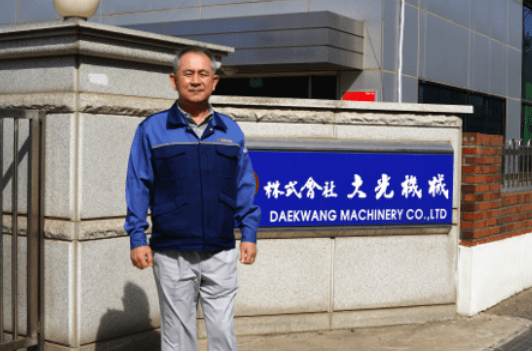Dae Kwang Machinery was established in 1973 as a manufacturer of tarpaulin machines for banners. It began exporting its lamination technology in 1986 and now has more than 200 machines installed in 24 countries worldwide. Around half of the company’s business today is producing machines for film extrusion laminating and paper and tarpaulin laminating – the balance of 50% is machines for pipes, sheets, and tubes, and Dae Kwang numbers the world’s leading toothpaste manufacturer amongst its portfolio of customers.
But, it was the decision to fit a Vetaphone corona treater to a laminator supplied to a customer in the Middle East, that marked the beginning of a new relationship between the Korean manufacturer and Vetaphone, the Danish pioneers of surface treatment technology, and it is being hailed as a major step forward in guaranteed quality.
Speaking for Dae Kwang, the President, Mr Tae Sik Bae commented: “Although we were previously aware of corona technology, we had no experience of Vetaphone quality until our customer specified the brand. Now, Vetaphone is our preferred supplier of surface treatment technology.” The customer in question is International Printing & Packing Co, based near Cairo, which claims the secure quality provided by Vetaphone’s consistent performance is an enhancement to its business, and a benefit to its customers.
Maintaining that lamination is no simple matter, Dae Kwang stresses the importance of using appropriate layer structures for each intended usage. For example, snack packaging has totally different requirements to paper cups, and toothpaste tubes are a world apart from rust prevention packaging or even carpets for car interiors – all of which are markets supplied by Dae Kwang.
Describing flexible packaging as the most demanding market because of its strong barrier requirements, Mr Bae said that these applications are served typically by co-extrusion machines. Paper substrates require heavy duty extrusion owing to the high paper grammage, in a market where durability is key. Woven substrates, on machines up to 4400mm wide, require high tension, while non-wovens, which have a variety of shapes and properties require more versatile equipment. Hot melt laminators perform the same function as the screws and T-Die on an extruder, but allow higher running speeds offline.
Of its projected US$10m sales turnover in 2017, some 60% will be exported, with leading customers in India, Bangladesh, and Vietnam. Currently some 10 – 15 machines are produced each year, but Dae Kwang is looking to rationalise its range to focus on film and paper lamination, and pursue a ‘high-tech only’ policy to guarantee premium quality. Fundamental to this is a ‘zero defect’ tolerance, and this includes all its component and ancillary suppliers.
“We see Vetaphone as the market leader and are presently investigating ways to fully integrate its technology within our machine lines. This will save costly space on the production floor, and improve functionality for the operator. We would do this only with a supplier whose technology matches our own in terms of quality and reliability,” he concluded. Citing a combination of solid background experience and a dynamic young team to take the company forward, Mr Bae, and his staff of 30 have ambitious plans for Dae Kwang, and indications are that the company’s quest for quality will bring major rewards.

